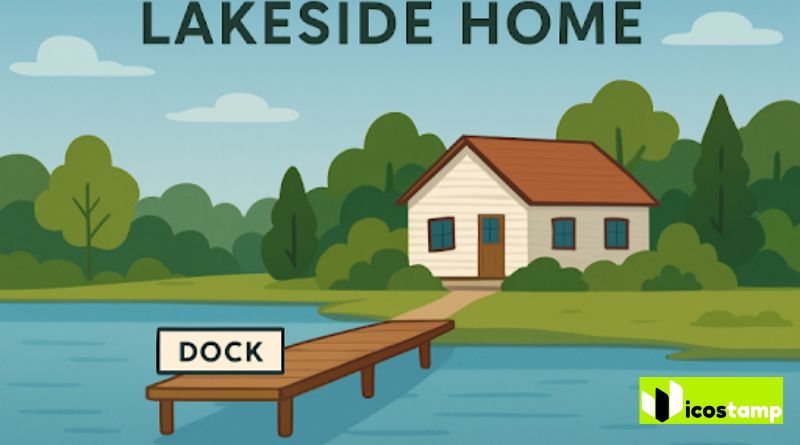Living on the water appeals to homebuyers seeking tranquility, scenic views, and direct access to recreation, offering a lifestyle focused on relaxation, nature, and well-being. Lakeside communities foster social connections through shared activities like boating and picnics, while practical benefits, such as private docks, watersports, and cooler summer temperatures, enhance daily life. Modern waterfront trends emphasize eco-friendly, walkable developments with climate-resilient features, making environmental sustainability a key.
Waterfront Living Draws Homebuyers
Lakeside properties vary widely, from rustic log cabins in quiet coves to modern single-family homes and low-maintenance condos. Each type offers different ownership experiences and upkeep requirements. For instance, cabins may provide privacy and charm, while condos include amenities and shared maintenance. Buyers should carefully review legal and zoning details, as water rights, shoreline regulations, setbacks, and dock permits can differ even between neighboring parcels. Lake access is not always guaranteed by property boundaries, making boundary checks and legal research crucial. Consulting a knowledgeable local expert, such as Blairsville, GA, real estate agent Lucretia Collins, can help buyers navigate regulations, avoid unexpected costs, and ensure all recreational activities, from fishing to jet skiing, are properly permitted within zoning rules.
Unique Considerations When Purchasing Waterfront Homes
Lakeside properties span a broad range, from rustic log cabins tucked along a quiet cove to modern single-family homes and low-maintenance condos. Each property type presents unique ownership experiences and maintenance demands. For example, cabins may offer seclusion and charm, while condos grant amenities and shared upkeep.
Buyers must carefully assess legal and zoning complexities. Water rights, shoreland use regulations, setbacks, and dock permits often vary even between adjoining parcels. Secure lake access isn’t always guaranteed by property lines—making boundary verification and legal due diligence essential. Consulting an agent familiar with local ordinances helps buyers avoid costly surprises and ensures every recreational activity, from fishing to jet skiing, is permitted within zoning limits.
The Value of an Experienced Real Estate Agent
The lakeside real estate market presents challenges that differ from standard home purchases. An experienced local agent brings in-depth market knowledge, from whisper listings and off-market opportunities to insight into seasonal price fluctuations.
These agents grant access to exclusive listings—including custom homes and historic properties quietly circulated within tight-knit communities. Their relationships with sellers and deep familiarity with the lakes provide buyers with a competitive edge, personalized guidance, and negotiation leverage.
Key Questions to Ask Before Making an Offer
Before committing to a lakefront purchase, buyers should inquire about the water quality, natural shoreline condition, and potential risks of flooding or erosion. The presence of algae blooms, invasive species, or outdated septic systems can affect property value and future enjoyment. Similarly, it is crucial to clarify community restrictions—some lakes ban motorized boats or restrict fishing to certain months. Many lakeside communities operate homeowner associations or impose annual fees to maintain shared beaches, docks, and roads. Understanding all financial obligations and rules is vital.
Financing Challenges and Solutions for Waterfront Properties
Securing a mortgage for a lakeside property can be more complex than for a standard home. Waterfront homes often appraise at higher values, but unique features—such as private docks or unbuildable acreage—may not be valued by all lenders. Many banks require detailed surveys and specialized appraisals, and buyers may need to secure additional insurance, like flood coverage, which can significantly impact carrying costs.
Agents well-versed in local financing conditions help buyers overcome these hurdles, connecting them to lenders familiar with waterfront underwriting requirements. They can also assist in coordinating appraisals, negotiating insurance stipulations, and providing creative solutions to keep sales on track.
Inspecting a Lakeside Home: What Buyers Should Know
A comprehensive inspection of a waterfront property goes far beyond the standard home-buying checklist. Homes near water are particularly vulnerable to issues such as water damage, shoreline erosion, and complications with septic systems located close to the lake. Structures such as docks and boathouses should be carefully assessed for stability, while elevation and drainage are crucial factors in evaluating flood risk. According to guidance from U.S. News & World Report on buying waterfront homes, specialized inspectors are often required. A knowledgeable real estate agent can help coordinate access to local experts familiar with the unique regional challenges of lakeside properties.
Tips for a Smooth Closing Process
Waterfront purchases often require extensive due diligence, including securing final surveys, confirming easements, and negotiating repairs for unique features such as docks or seawalls. Reviewing every document with legal or title professionals helps to prevent unwelcome surprises. As closing approaches, buyers and their agents should be prepared for additional steps—such as final walk-throughs on water access points and ensuring accurate transfer of HOA memberships.
Proactive, detail-oriented work ensures closing is streamlined and every right or responsibility is clear from day one.
Planning for the Long Term: Ownership and Stewardship
Lakeside ownership extends beyond the initial purchase. Proper maintenance of shorelines, docks, and septic systems helps protect property value and maintain ecological health. Many areas have conservation ordinances aimed at preserving water quality and preventing erosion—compliance benefits both homeowners and the community. Consistently following best practices supports local wildlife, reduces repair costs, and fosters positive relationships within the neighborhood.
Real estate agents remain valuable resources even after the sale—helping introduce buyers to conservation programs, reputable contractors, and lake associations for long-term stewardship and community integration.
Conclusion
Waterfront living offers scenic beauty, tranquility, and recreational opportunities, but also presents unique challenges, including legal complexities, financing, and specialized maintenance. Working with an experienced local real estate agent helps buyers navigate regulations, inspections, and the closing process more effectively. Long-term stewardship, including shoreline and ecological care, is crucial to preserving property value and maintaining a sustainable lakeside lifestyle.

